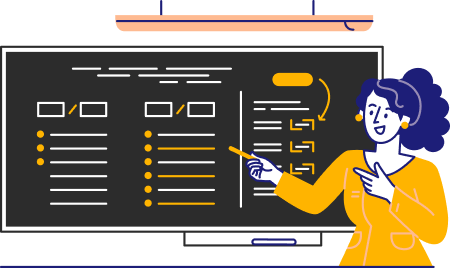Your hard work is paying off, and you received an interview request email! Now, how do you respond professionally to get off to a great start in the next steps of the hiring process?
Just like resume templates and cover letter generators give you a solid base to start with, so can a good step-by-step process for how to respond to an interview request email.
In this article, we’ll guide you through the whole process. We’ll start with essential details you must consider for your response, then provide real-world examples that have worked well for other job seekers, and finish by answering common questions. By the end, you’ll be equipped to form a top-notch response to every invitation to interview.
Responding to an Interview Request

How you respond to an interview request sets the tone for the next steps of the hiring process. You want to ensure your response is prompt and professional while displaying enthusiasm about the opportunity. Let’s review the steps and necessary information you need to structure your response effectively.

Respond promptly
You should respond to interview invitation emails within 24 hours to make a good first impression.
Modern hiring processes are fast-paced. Most applications are filled out online, and many job recruiters communicate with applicants via email for quicker responses. Therefore, while you should put some effort into your reply to an interview request, it’s also important to respond quickly to show eagerness and respect for the hiring manager’s time.
The hiring manager might even have an immediate vacancy they must fill. For example, an opening in an IT team could slow down diagnostic and troubleshooting processes for computer errors, affecting the whole company. So, it’s not uncommon for hiring managers to feel a need to make a decision quickly. Acting too slowly could lead to missing out on great opportunities.

Use a professional greeting
As you may have seen in cover letter templates, a professional greeting is essential at the start of all correspondence.
You always want to address the hiring manager by name, so the message feels specific to them. So, avoid any generic greetings like “Dear sir/madam.” Instead, go with something like “Dear Ms. Adams” or “Hello Mr. Parker.” Beginning with “dear” or “hello” are both safe choices to maintain professionalism.
If you’re looking for something more gender-neutral, you could also address the hiring manager by their first and last name, such as “Dear Evelyn Matthews.”

Show appreciation
Once you get to the interview, hiring managers will ask you questions like “Why do you want to work here?” since they want to bring in new employees who are excited about the role and the organization’s mission.
You can use your response to an interview request to immediately begin showing your enthusiasm and appreciation for the opportunity. For example, you could end your email by saying:
“Thank you, and I’m excited to discuss further on Tuesday how my market research skills can help you connect with your customers’ health needs at Lifeline Wellness.”

Confirm your availability
If you’ve ever researched how to respond to a job offer, you probably found it best to confirm specific details like your start date and any negotiated terms. You want to take a similar approach when accepting an interview through email.
You should confirm the date, start time, and location of your interview somewhere in your message to avoid confusion and reinforce that you’re planning to attend the meeting.
If you’ve already been given the meeting’s details, it’s best to write this as a statement, such as:
“I’m confirming that I’m available to meet over Zoom on Wednesday the 19th at 2 p.m. EST.”
You could also try to incorporate the confirmation into your message naturally, saying something like:
“I’m looking forward to discussing in more detail how I can contribute to your innovative IT team during our Zoom meeting on Wednesday the 19th at 2 p.m. EST.”

Ask for clarifications if needed
When you’re unsure about any of the interview’s details, it’s always best to ask beforehand so you’re prepared. Knowing all the necessary information can help job seekers feel less nervous ahead of an important interview. Some common clarifications you could ask for are:
- What will the interview format be? Will it be a one-on-one interview or a panel interview in front of a hiring committee? Will the topics be informational about the job’s responsibilities or situational on how you’d handle real-world problems?
- How long will the interview be? It’s good to know an estimated length to ensure the interview’s duration fits your schedule.
- Is there anything I need to bring to the interview? Some companies might want you to bring a copy of your portfolio or resume to the interview. It’s good to know ahead of time to avoid looking unprepared.
You can also ask about any other details you’re unsure of, like the meeting’s location or start time. Even if they gave you the information before, hiring managers don’t mind repeating it to avoid scheduling errors.

Close with a professional sign-off
The way you end your interview acceptance email is just as important as how you begin it since it’ll make the final impression on a hiring manager before they meet with you.
It’s a good idea to close out by thanking them for the opportunity to interview. Then, use a professional sign-off. Good formal sign-offs are “sincerely,” “thank you,” or “best regards.” These are all safe choices that will reinforce your professionalism.
Lastly, end with your first and last name and include contact information, like your phone number, so they can get in touch with you.

Proofread your email before sending
A response to an interview request that’s full of grammatical errors will detract from your professionalism. To avoid making a poor first impression before your interview, proofread your email thoroughly before sending it. You could run it through a grammar checker or have a trusted friend or colleague review it to help with this step.
Examples of Interview Request Replies

Just like resume examples and resume builders are building blocks to success that’ll help you land an interview, examples of interview request replies will have a similar impact. Let’s review some real-life scenarios with examples of how you can respond to each.
Confirming an Interview
Subject line: Plant Technician Interview Request
Dear Mr. Martens,
Thank you for considering me for the plant technician role at General Mills. I’m excited to move on to the next steps in the hiring process and discuss further how my abilities in material handling and power tools can fit into your fast-paced manufacturing processes.
I’m available to meet with you at your Brooklyn office on Monday, June 10th, at 11 a.m. Thank you, and I look forward to discussing further how I can contribute to your team’s success as you continue striving to provide your customers with the highest-quality food products.
Best regards,
Kyle Thomspon
347-590-2367
Conflicting Schedules
Subject line: Interview for Scientific Project Manager Position
Dear Ms. Richards,
Thank you for inviting me to interview for the scientific project manager position at the University of Delaware. Unfortunately, I won’t be available to meet on Tuesday, June 11th. I will be available on Thursday, June 13th, or Friday, June 14th, between 10 a.m. to 3 p.m. either day. Please let me know if any of those days or times work for your schedule.
Thank you again for considering me for your analytical research team, which seeks to advance biomedical solutions. I’m excited to discuss further how my capabilities in team leadership and following OGC regulations will fit into the role.
Sincerely,
Jacob Peterson
302-546-1423
Confirming a Virtual Interview (With Clarification)
Subject line: Interview Confirmation for ESL Instructor Role
Dear Ms. Garrison,
Thank you for the opportunity to interview for the ESL instructor role with the Lansing School District. I’m confirming my availability to meet with you via Microsoft Teams on Friday, June 14th, at 12 p.m. EST. Could you please provide the platform’s details and any specific instructions I need to know to log into the meeting?
I’m eager to discuss how my curriculum planning and small-group instruction experience will fit in with your literacy program. Thank you for the opportunity to move on to the next steps of joining your forward-thinking educational team.
Sincerely,
Elizabeth Kirkdale
517-989-3245
Request to Call
Subject line: Availability to Discuss Social Media Coordinator Role
Dear Mr. Jackson,
Thank you for requesting a call to discuss the responsibilities of your social media coordinator role with the Kansas City Royals Baseball Club, as you’re seeking to reach new fans on social platforms.
I’m available to meet for a phone call on Wednesday, June 12th, at 9 a.m. Please let me know if this time works for you or if there’s an alternate day or time that would be better.
I look forward to discussing how I can contribute to the Kansas City Royals’ growing social media presence and make an impact on our local baseball-loving community.
Thank you,
Paige Tyson
816-987-6543
Declining an Interview Request
Subject line: Interview Request for Personal Trainer Role
Dear Mr. Benson,
Thank you for the opportunity to interview for the personal trainer position at Planet Fitness. After careful consideration, I’ve decided to move forward with another opportunity and will be withdrawing my application. I appreciate your time and considering me for your health-focused team, and I wish you the best of luck in finding the right candidate for the role.
Best regards,
Natasha Stevenson
765-435-3678
Tips for Responding to an Interview Request

Now that you have the proper structure and some examples of how to respond to an interview request, let’s cover some tips that’ll help you make the right impact with your response.

Don’t change the subject line
When you receive an interview request through email, you shouldn’t change the subject line when you respond. It’s usually best to respond directly to the email the hiring manager sent you rather than creating a brand new email thread.
Using the same subject line helps hiring managers keep their inboxes organized and will ensure your response stands out when they receive it. After all, most business decision-makers have busy schedules with lots of conversations they need to manage, so anything you can do to keep things organized is essential.

Thank the hiring manager
Always thank the hiring manager for the opportunity somewhere in your message. This will reinforce your enthusiasm for the role and immediately set a positive tone for your interaction.
A good way to make this stand out is to craft a thank-you sentence that sounds specific and personal to each job.
Rather than just saying, “Thank you for the opportunity,” you can expand on this a bit more by saying something like, “Thank you for considering me for the fifth-grade teacher role at Mayville Academy, where I can help make learning more engaging for students.”

Provide your availability
In today’s fast-paced hiring processes, hiring managers want to minimize the time they spend scheduling interviews. Therefore, be specific when you detail your availability for an interview.
Providing an exact day and time or a range of times during the day that all work for you will help streamline this process. That way, you can handle the scheduling process in a couple of quick messages and show how you’ll communicate effectively on the job.

Keep your tone professional
Maintaining a professional tone in your email will show that you’re serious about the opportunity and set a positive tone for how you’ll conduct yourself in the workplace.
It’s always best to be more formal in initial messages with hiring managers since you’re just introducing yourself to them. Later, as you move on to the next steps of the hiring process and potentially get hired, you can narrow in on the tone they use in the workplace and start matching that to fit in with their culture.

Ask questions about the interview
Don’t hesitate to ask questions you have about the interview. Hiring managers like seeing this as it shows your interest in the role and preparedness for the interview. Whenever you communicate well and do what it takes to be successful, it signifies you’ll do the same once you’re hired and join the workplace.
Resources for Interview Preparation

If you feel like interviews are nerve-wracking, you’re not alone. Many professionals have ups and downs in this process, especially as you’re beginning a new career or reaching for higher opportunities.
Fortunately, this is a skill you can work on and grow over time, and several resources are available to help. Let’s review some of the steps you can take to prepare before your interview after you’ve accepted the request.

Company research
You probably took this step while writing your cover letter and tailoring your resume to the position’s needs. However, when you apply to several companies, it’s common to forget some details by the time you hear back with a request to interview.
Before the scheduled day of your meeting, take some time to review the company’s website and social media profiles, where they discuss aspects like their mission, recent projects, or industry trends. Having this information in the back of your mind will help you customize your responses to stand out during the interview.

Role-specific preparation
Every role you apply to has specific needs, and requirements can vary for each company you interview with. Review the job description again and find ways to align your skills and experiences with the role’s requirements.
The company might use specific software where you can express your expertise, or they might discuss a problem that you’ve solved before. Adding those extra details to your answers during the interview will make you stand out as the perfect fit for their current needs.

Mock interviews
Practicing before the interview can help you prepare for common questions and gain confidence in communicating your skills.
To prepare for this process, you can perform mock interviews with a trusted friend, family member, or colleague. Additionally, if you’re a college student, many campuses have resources in their student services department to help you prepare for interviews and may even allow you to do mock interviews with advisors.
If you don’t have anyone to practice with, you could also try recording yourself answering common questions and note where you could improve your responses.
Respond to an Interview Request FAQs

It’s best to respond within 24 hours to all interview requests through email. A quick response shows respect for the hiring manager’s time, that you’re enthusiastic about the role, and ensures you don’t miss out on any opportunities during fast-paced hiring processes.
Your response to an interview request should include a professional greeting, a show of gratitude for the opportunity, a list of when you’re available to meet, any questions you have, and a professional closing. The examples listed above in this article will help you format your response to make a great impression.
When declining an invitation to interview, keep your message brief and be grateful for the opportunity. Include a short explanation for your decision, such as saying you accepted a role with another company. You can also wish the hiring manager success in their search for the right candidate.
When a hiring manager sends you a request to interview via email, it’s best to reply to them in an email rather than calling. Some hiring teams prefer a written record to ensure clarity, and having it written down can help organize your records, too. That said, if their message specifies you should call to confirm, follow those instructions instead.
Yes, it’s okay to politely ask for an extension to respond to an interview request. When asking for more time, you should explain your reasoning, such as if a family emergency came up or you’re sick. It’s also a good idea to provide a timeline when they can expect to hear from you so there’s no confusion on either side.





